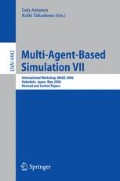Abstract
This paper addresses agent modeling in multiagent-based simulation (MABS) to explore agents who can reproduce human-like behaviors in the sequential bargaining game, which is more difficult to be reproduced than in the ultimate game (i.e., one time bargaining game). For this purpose, we focus on the Roth’s learning agents who can reproduce human-like behaviors in several simple examples including the ultimate game, and compare simulation results of Roth’s learning agents and Q-learning agents in the sequential bargaining game. Intensive simulations have revealed the following implications: (1) Roth’s basic and three parameter reinforcement learning agents with any type of three action selections (i.e., ε-greed, roulette, and Boltzmann distribution selections) can neither learn consistent behaviors nor acquire sequential negotiation in sequential bargaining game; and (2) Q-learning agents with any type of three action selections, on the other hand, can learn consistent behaviors and acquire sequential negotiation in the same game. However, Q-learning agents cannot reproduce the decreasing trend found in subject experiments.
Access this chapter
Tax calculation will be finalised at checkout
Purchases are for personal use only
Preview
Unable to display preview. Download preview PDF.
References
Axelrod, R.M.: The Complexity of Cooperation: Agent-Based Models of Competition and Collaboration. Princeton University Press, Princeton (1997)
Binmore, K.G.: Game Theory and the Social Contract: Just Playing, vol. 2. The MIT Press, Cambridge (1998)
Bosse, T., Jonker, C.M.: Human vs. Computer Behaviour in Multi-Issue Negotiation. In: First International Workshop on Rational, Robust, and Secure Negotiations in Multi-Agent Systems (RRS 2005), pp. 11–24. IEEE Computer Society Press, Los Alamitos (2005)
Erev, I., Roth, A.E.: Predicting How People Play Games: Reinforcement Learning in Experimental Games with Unique, Mixed Strategy Equilibria. The American Economic Review 88(4), 848–881 (1998)
Friedman, D., Sunder, S.: Experimental Methods: A Primer for Economists. Cambridge University Press, Cambridge (1994)
Iwasaki, A., Ogawa, K., Yokoo, M., Oda, S.: Reinforcement Learning on Monopolistic Intermediary Games: Subject Experiments and Simulation. The fourth international workshop on Agent-based Approaches in Economic and Social Complex Systems (AESCS 2005), pp. 117–128 (2005)
Kagel, J.H., Roth, A.E.: Handbook of Experimental Economics. Princeton University Press, Princeton (1995)
Kawai, T., Koyama, Y., Takadama, K.: Modeling Sequential Bargaining Game Agents Towards Human-like Behaviors: Comparing Experimental and Simulation Results. In: The First World Congress of the International Federation for Systems Research (IFSR 2005), pp. 164–166 (2005)
Moss, S., Davidsson, P.: Multi-Agent-Based Simulation. In: Moss, S., Davidsson, P. (eds.) MABS 2000. LNCS (LNAI), vol. 1979, Springer, Heidelberg (2001)
Muthoo, A.: Bargaining Theory with Applications. Cambridge University Press, Cambridge (1999)
Muthoo, A.: A Non-Technical Introduction to Bargaining Theory. World Economics, 145–166 (2000)
Nydegger, R.V., Owen, G.: Two-Person Bargaining: An Experimental Test of the Nash Axioms. International Journal of Game Theory 3(4), 239–249 (1974)
Ogawa, K., Iwasaki, A., Oda, S., Yokoo, M.: Analysis on the Price-Formation-Process of Monopolistic Broker: Replication of Subject-Experiment by Computer-Experiment. The, JAFEE (Japan Association for Evolutionary Economics) Annual Meeting, 2005 (in Japanese) (2005)
Osborne, M.J., Rubinstein, A.: A Course in Game Theory. MIT Press, Cambridge (1994)
Roth, A.E., Prasnikar, V., Okuno-Fujiwara, M., Zamir, S.: Bargaining and Market Behavior in Jerusalem, Ljubljana, Pittsburgh, and Tokyo: An Experimental Study. American Economic Review 81(5), 1068–1094 (1991)
Roth, A.E., Erev, I.: Learning in Extensive-Form Games: Experimental Data and Simple Dynamic Models in the Intermediate Term. Games and Economic Behavior 8(1), 164–212 (1995)
Rubinstein, A.: Perfect Equilibrium in a Bargaining Model. Econometrica 50(1), 97–109 (1982)
Schelling, T.C.: The Strategy of Conflict. Harvard University Press (1960)
Ståhl, I.: Bargaining Theory, Economics Research Institute at the Stockholm School of Economics (1972)
Spulber, D.F.: Market Microstructure -Intermediaries and the theory of the firm. Cambridge University Press, Cambridge (1999)
Sutton, R.S., Bart, A.G.: Reinforcement Learning – An Introduction –. The MIT Press, Cambridge (1998)
Watkins, C.J.C.H., Dayan, P.: Technical Note: Q-Learning. Machine Learning 8, 55–68 (1992)
Author information
Authors and Affiliations
Editor information
Rights and permissions
Copyright information
© 2007 Springer-Verlag Berlin Heidelberg
About this paper
Cite this paper
Takadama, K., Kawai, T., Koyama, Y. (2007). Can Agents Acquire Human-Like Behaviors in a Sequential Bargaining Game? – Comparison of Roth’s and Q-Learning Agents –. In: Antunes, L., Takadama, K. (eds) Multi-Agent-Based Simulation VII. MABS 2006. Lecture Notes in Computer Science(), vol 4442. Springer, Berlin, Heidelberg. https://doi.org/10.1007/978-3-540-76539-4_12
Download citation
DOI: https://doi.org/10.1007/978-3-540-76539-4_12
Publisher Name: Springer, Berlin, Heidelberg
Print ISBN: 978-3-540-76536-3
Online ISBN: 978-3-540-76539-4
eBook Packages: Computer ScienceComputer Science (R0)

